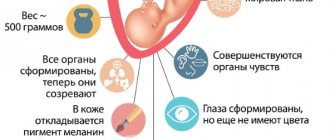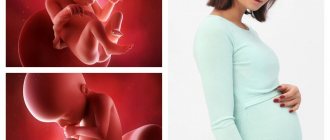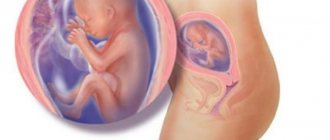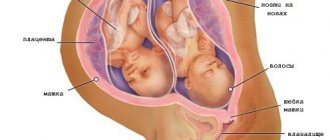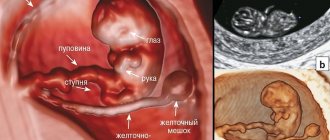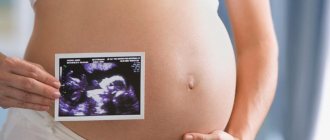Fruit (development, size)
The first trimester of pregnancy is ending, and by this time the child’s body has achieved tremendous success in its development. The small heart is amazing: every day it pumps 23 liters of blood! By this time, all of the baby’s baby teeth are already fully embedded.
But the achievements do not end there: at the 13th week of pregnancy, bone and muscle tissue continues to form, and the baby’s digestive system develops. Thus, the first villi are formed in the intestines, which in the future will take part in the digestion and movement of food. The pancreas is already producing its first insulin. The child's vocal apparatus began to form. The genital organs are increasingly differentiated: this week the genital tubercle lengthens and either gradually turns into a penis, or bends downwards, forming the clitoris. The sex cells or prostate gland develop, depending on the sex of the fetus.
The child’s appearance also gradually acquires more expressive features. The body is gaining momentum in growth - over time it will look larger and larger relative to the head. Now the coccygeal-parietal size of the fetus is on average 7-8 cm, and its weight ranges from 15-25 g.
A huge amount of work has been done to lay down the main organs and systems, and now it’s the turn of the emotional sphere. At the 13th week of pregnancy, the baby is active all the time: he listens, learns new skills, reacts to signs coming from the outside world (sounds and silence, light and darkness, heat and cold, various kinds of touches). Now the baby is more and more awake, falling asleep only for a few minutes and waking up again. The movements of the fetus are no longer as chaotic as before, and have some order.
At the 13th week of pregnancy, the baby distinguishes the smells and tastes of the food consumed by the mother. He may not like everything from the proposed menu, but on the contrary, he will really love some products. Just imagine: he not only knows how to suck and swallow, he already yawns, smiles and makes grimaces! The baby is very comfortable in his mother’s tummy: it is warm, cozy, calm, soft, the sounds coming from outside pleasantly lull him to sleep, he is surrounded by a soothing twilight...
If by this time you have not yet established a tradition of communication with your child, then the transition to the second trimester is the time. The most tranquil period for mother and baby begins - use every minute of it for your and his pleasure.
Nutritional Features
At this stage, women, as a rule, feel the desire to provide nutrition for themselves and the child, which creates a brutal appetite, against the background of the absence of toxicosis.
Important!!! Saturation will be achieved by increasing the nutritional intake by only 300 kcal. Following the norms will allow you to maintain your clothing size after childbirth (especially if we are talking about twins), protect your lower back from excessive stress caused by excess weight, and also maintain your general well-being.
To achieve nutrition optimization for a given period, it is necessary to introduce the following restrictions:
- reduce as much as possible the consumption of various sweets (sweets, chocolates);
- try not to eat canned food, smoked meats, or fast food.
They should be replaced with products such as:
- boiled meat;
- milk products;
- vegetables;
- fruits.
Such nutritional adjustments will not only bring your weight back to normal, but also create resources for the correct development of the baby, regardless of his gender. This is especially true for the indicators of TVP, KTR and PRR and the absence of toxicosis.
The golden rule is to replenish three elements:
- Protein.
Lean meat, cottage cheese, chicken eggs, etc. It has become a kind of building material for the fetus, since its participation plays a key role in the formation of muscles and tissues.
- Iron.
Red meat, buckwheat, apples. Since iron has become a key element in the process of transporting oxygen in the body, its absence threatens the saturation of cells. The consequence may be anemia of the limbs, which is quite difficult to tolerate when carrying a baby of any gender. In order to achieve maximum absorption concentration, normal nutrition should be balanced with vitamin C - it ensures better absorption.
- Calcium.
Dairy products. Thanks to the consumption of calcium, a favorable nutritional background is created, due to which the fetus (or twins) receives the necessary basis for building solid structures of the body (bones, teeth).
Interesting information!!! Most women take vitamins to support the development of their baby, mistakenly believing that they are able to completely restore the balance of the body - this is not so. Vitamins can really help a woman’s body, but it looks a little different, since nothing can replace the required level of absorption, which is only available with proper nutrition.
The choice of any supplements occurs only with obstetric support. It is important to provide a detailed description of your diet, on the basis of which obstetric support for the child’s development is compiled, in terms of food choice. If there are signs of toxicosis, food is chosen in a special way.
Feel
At the 13th week of pregnancy, a woman, as a rule, no longer feels sick. The “hormonal riot” is over, the body has adapted to the changes that have occurred and has become accustomed to the new state. The second trimester is the calmest of all periods of pregnancy: most of the signs, symptoms and ailments associated with the onset of pregnancy are already behind us, but still this time cannot be called absolutely carefree. It's time to get serious about preventing stretch marks, constipation and swelling.
By the 13th week of pregnancy, the waist gradually disappears and the tummy becomes rounded. Chances are you've already switched to maternity clothes. Otherwise, update your wardrobe now. Pay special attention to the bra: it should be the size of your growing breasts and support them well (wide straps do this). The breasts will grow and fill out throughout the entire period: compared to the pre-pregnancy state, its weight by the end of pregnancy will increase at least two, or even four times.
Abortion
Abortion at this stage is impossible at the request of the woman, as it carries a risk to her health. The main method of performing an abortion is vacuum technology. It allows you to eliminate the fetal body, even if we are talking about twins, but the risks are quite high. Medical abortion is no longer able to eliminate pregnancy, so surgery is the only option. The difficulty is in the borderline state, since abortions are officially allowed up to 12 weeks. Thus, an indication is required for an abortion at 13 weeks. These may include:
- the need for an abortion due to a missed abortion;
- the need for abortion due to any obvious developmental pathologies.
In any case, abortion is undesirable in terms of consequences.
Uterus at 13 weeks of pregnancy
Just like the fetus, the uterus is constantly growing, rising higher and higher. At the 13th week of pregnancy, it fills almost the entire hip area and rises higher - into the abdominal area. Neighboring organs will have to make room, and this will cause some inconvenience in the future: heartburn, shortness of breath, and others.
During each examination, the gynecologist will now measure the height of the uterine fundus. It is equal to the number of weeks in centimeters. So, at the 13th week of pregnancy, the uterus is 13 cm high and 10 cm wide. It can already be easily felt, especially if a thick fat layer does not prevent this.
In the second trimester, the tone of the uterus will no longer be so bad - it becomes softer and more elastic, and, as a rule, contracts for a short time.
Mother's well-being in the third month of pregnancy
The discomfort of the first trimester of pregnancy goes away and women completely get used to the new condition, but may be bothered by abdominal pain and heavy discharge.
Uterus size at 13 weeks of pregnancy
The fetus increased in size, and with it the uterus. At this time, it becomes softer and more elastic. At thirteen weeks, the uterus already fills the hip area and moves further into the abdominal cavity. At the same time, nearby organs are somewhat compressed, for this reason, shortness of breath, heartburn, etc. may occur at 13 weeks.
How to deal with heartburn, which plagues many mothers expecting a baby, read the article Heartburn during pregnancy>>>.
During the examination, the gynecologist measures the fundus of the uterus. This allows you to clarify the duration of pregnancy. The height of the uterus at this stage is 13 cm, and the width is 10 cm.
Why does your stomach hurt at 13 weeks of pregnancy?
- Short-term pain on the sides of the abdomen is usually caused by a sprain of the ligaments that hold the uterus and are not dangerous. Therefore, women may feel that their stomach is “pulling” at the 13th week of pregnancy (read the article on the topic: During pregnancy, the lower abdomen is pulling >>>);
- Another cause of pain at 13 weeks may be the accumulation of gases in the intestines. Adjusting your diet will help: eliminate foods that, according to your observations, cause increased gas formation. You can learn more about nutrition from the book Secrets of proper nutrition for an expectant mother>>>;
- Spasmodic pain, concentrated in the lower abdomen, is associated with increased uterine tone. Essentially, excessive muscle tension occurs, which means you can get rid of it through maximum relaxation. Therefore, if the environment allows, the expectant mother should lie down and rest.
Heels, weights and stress are excluded, as all this provokes an increase in tone. If this problem happens often, tell your doctor. It is possible to prescribe antispasmodics and magnesium preparations. For pain accompanied by bloody, lingering discharge, you need to limit physical activity as much as possible and urgently go to the hospital.
Bleeding
- Bleeding during pregnancy at thirteen weeks is quite common, but most of it is not dangerous. Eighty percent of pregnant women who experience bleeding at 13 weeks subsequently safely give birth to healthy babies;
But consulting a doctor is certainly necessary to rule out such dangerous conditions as abruption or placenta previa. In this case, the pregnant woman is recommended to completely avoid physical and psychological stress for some time. For some women, the only right decision is to be admitted to hospital.
- In addition, the cause of bleeding at this period can be a hematoma or injury to the cervix during sex or a gynecological examination. Other reasons include neoplasms, increased fragility of blood vessels, and various bruises.
Not all of the above conditions are equally dangerous, but clarification of the diagnosis is required. For this, the doctor may refer you for an ultrasound, which will clarify the cause of the bleeding and help see the condition of the mother and fetus.
Discharge at 13 weeks of pregnancy
More intense discharge at this time is normal, the main thing is that its smell or color does not change. If the discharge becomes gray, yellow, green, red, brown, smells sharp and unpleasant, acquires a cheesy consistency, bubbles, causes discomfort, pain, itching or burning, then do not hesitate to consult a doctor.
Possible infection or threat of miscarriage. In particular, brown discharge at 13 weeks of pregnancy indicates placenta previa or internal bleeding (read more in the article Brown discharge during pregnancy>>>). The latter, although it does not directly affect the fetus, reduces the total volume of blood flow to the mother, which means that the fetus experiences oxygen deficiency and suffers.
Feelings at 13 weeks
- Changes in hormonal levels and growth of the uterus can cause constipation. This is where fiber-rich foods will come to the rescue (see also the Nutrition section). If adjusting your diet does not help, you need to visit a doctor, because not every laxative can be taken by a pregnant woman. The doctor will prescribe suitable medications, for example, probiotics or special suppositories with glycerin and papaverine;
- Breasts enlarge because the ducts of the mammary glands begin to fill with colostrum (useful article: Colostrum during pregnancy >>>);
- At this time, the likelihood of thrush or candidiasis is very high. The causative agent is a fungus from the genus Candida, which normally lives in the female vagina. Taking advantage of the fact that the mother’s body is busy with active hormonal changes, and the immunity is naturally reduced (after all, with the proper immune response, pregnancy simply will not survive), the fungus actively multiplies.
A woman may experience severe itching, vaginal soreness, and white discharge in the form of flakes. Sometimes the disease is painless, but with discharge. In any case, medical consultation and treatment are needed. What to do if you have such symptoms, read the article: Thrush during pregnancy>>>.
- Blood sugar levels are reduced due to the active consumption of it by the fetus during growth;
- At 13 weeks, bleeding gums may appear when brushing your teeth, as well as increased sensitivity of the oral mucosa to hot and cold;
- After the formation of the uteroplacental circulation, hypotension (low blood pressure) may appear. This is not particularly noticeable, but with a very strong decrease in pressure, the peripheral blood vessels of the uterus contract, reducing blood supply to the fetus. In this case, drug treatment is necessary.
Stomach
During moments of increased uterine tone, you may feel stretching and pain in the lower abdomen. At such moments you just need to lie down and rest. If this happens often, the doctor will advise you to use suppositories with papaverine or drink Ginipral, for example. But many mothers do without any medications. Just learn not to “disturb” your uterus once again: don’t wear heels, don’t carry heavy things, don’t get nervous over trifles.
The stomach may also hurt due to gas formation. Monitor your diet and the presence of such a relationship. Some foods may need to be eliminated from your diet.
For most women, at the 13th week of pregnancy, the belly already reveals their position: it has become rounded, or even noticeably grown. But it happens that the tummy is just beginning to appear, and it seems as if you have just gained a little weight.
What can be seen on an ultrasound
The 13th week of pregnancy with twins is one of the periods for ultrasound screening. It is done from 10 to 14 weeks.
Photo of twins on ultrasound at 13 weeks of pregnancy:
The study is necessary for the early detection of gross pathologies in the development of future children, such as:
- Down syndrome;
- Patau syndrome;
- Edwards disease;
- defects of the nervous system;
- abnormalities in the development of the brain and spinal cord.
The specialist determines the exact duration of pregnancy, examines the internal organs, performs fetometry, evaluates the cardiac activity of the fetus and the volume of amniotic fluid.
One of the main indicators of chromosomal disorders is the thickness of the nuchal translucency. It represents the cervical fold. In some pathologies, fluid accumulates underneath it.
Normal indicators for the 13th week of pregnancy:
| KTE/mm | BPR/mm | Head circumference/mm | Abdominal circumference/mm | Collar thickness/mm | Thigh length/mm | Nasal bones/mm | Heart rate beats/min |
| 51-75 | 20-28 | 68-96 | 65-84 | 0,7-2,7 | 8-14 | 2,0-3,2 | 147-171 |
You might be interested to know
Find out from our article about managing multiple pregnancies.
I'm expecting twins. What to take to the maternity hospital? You can find a list of necessary things here.
Pain
If abdominal pain at 13 weeks of pregnancy is accompanied by spotting, then it is better to warn your doctor about this. Try to limit physical activity for a while, and if bleeding starts, go to the hospital immediately.
It is not at all uncommon to have pain on the sides of the abdomen at 13 weeks. This stretches the muscles that hold the uterus, and the uterus itself is constantly stretching. Such pains are not dangerous, but if you are excited, then lie down to rest - it will not harm.
Pain in the legs, accompanied by cramps in the calf muscles, is a signal of a lack of calcium in the body. Typically, such pain occurs at night. Increase the amount of calcium-containing foods in your diet - this element is very important now. Just give preference to plant sources of calcium, since the animal quickly ossifies the fontanel, which is undesirable during the passage of the child through the birth canal.
13 week pregnancy video
13 week pregnancy photo
Cold at 13 weeks of pregnancy
If you have a sore throat, and also a headache, and the whole body, and the temperature has risen or a runny nose has begun, then you need to treat the cold. The likelihood of getting the flu during pregnancy is very high, so you should avoid crowded places, especially during the peak of viral diseases. And although a cold at the 13th week of pregnancy is no longer as dangerous as in the first trimester, its severe course can cause some abnormalities in the development of the child and even premature birth. Therefore, do not let a cold get worse, but start treatment immediately. Try traditional medicine first, and only if the condition worsens, turn to medication. All your actions should be coordinated with your doctor so as not to harm the baby.
Temperature
Doctors say that there is no need to lower your temperature during pregnancy. But if it stays at 38 C for more than two days or rises, then you need to take an antipyretic. Consult your doctor in choosing a medicine, these may be paracetamol-containing drugs or homeopathic antipyretics.
The temperature at the 13th week of pregnancy can still remain normal at subfebrile levels. There is no need to worry if you feel well, nothing hurts, you do not feel this increase in temperature and it is not accompanied by yellow-green or bloody discharge.
Possible problems
At the 13th week of pregnancy, the expectant mother may experience the following health problems:
| Increased tone of the uterus, which causes a sensation of a lump or ball in the lower abdomen | A woman may also mistake this for fetal “movements.” Hypertonicity is a common phenomenon; more than half of pregnant women experience it. You must inform your gynecologist who is caring for your pregnancy about this. He may prescribe Papaverine, No-shpu and other antispasmodic drugs. The danger of this condition in the early stages is that complications may arise - impaired blood supply to the uterus, fetal hypoxia; threat of miscarriage. Towards the end of gestation, this symptom does not pose a danger, as it is a “training” harbinger of labor. Risk factors for the development of hypertension include, first of all, emotional and physical overload, which should be avoided throughout pregnancy; hormonal imbalance; fibroids, endometriosis, inflammatory pathologies in the pelvic organs; history of surgery. |
| Hypertension | It may be invisible to the woman herself, but this condition is also dangerous for both the fetus and the mother. Therefore, pressure measurements are performed at every inspection. Symptoms of arterial hypertension include headache, dizziness, blurred vision, pain behind the sternum or in the scapula area. To reduce blood pressure, the doctor prescribes drugs such as Methyldopa, Nifedepine, Metoprolol and others. In severe cases, termination of pregnancy or early delivery at a later date may be recommended. Starting from the 20th week of pregnancy, women with high blood pressure may develop the condition of preeclampsia - a generalized spasm of blood vessels, which leads to deterioration in the functioning of vital organs (brain, kidneys, liver) and disruption of fetoplacental blood flow. |
| Lower blood pressure | Its signs are dizziness, a sudden onset of general weakness, nausea, and lightheadedness. This phenomenon is also observed with toxicosis and can be triggered by hunger. To prevent a drop in blood pressure, it is recommended to eat in frequent and small portions, drink vitamin supplements, avoid stuffy rooms, and get up in the morning slowly, with breakfast in bed. |
| Premature placental abruption | If bloody discharge appears from the genital tract or a nagging pain in the abdomen occurs, you should immediately contact an obstetrician-gynecologist. This may indicate the development of a pathological process of separation of the placenta from the surface of the uterus, which will lead to fetal death and spontaneous miscarriage. Risk factors for the development of this condition include arterial hypertension, falls, injuries, violence, smoking and drug use, infectious diseases, the young age of the expectant mother, autoimmune pathologies, and placenta previa. In this case, the pregnant woman is placed in a hospital “for safekeeping.” |
| Constipation caused by decreased intestinal motility | The bolus of food moves into the gastrointestinal tract more slowly and becomes denser. This is also facilitated by hormonal changes in the body and the growing uterus, which leaves less and less free space in the abdominal cavity. If such a problem occurs, you should consult a doctor who will prescribe laxatives that are safe to take during pregnancy. |
| Chronic constipation can lead to another undesirable phenomenon - hemorrhoids. | It is a varicose vein in the rectum, in which nodules form in the anus. With constant overexertion, they can become inflamed and bleed. |
Since the enlarging uterus begins to put more and more pressure on surrounding organs, an increased urge to urinate may occur. In this case, you must first take a urine test to rule out kidney and bladder disease.
If they are normal, then this condition does not pose a danger. Urinary retention should not be allowed, as it contributes to the development of infectious diseases.
It should be borne in mind that at the 13th week of pregnancy, any diseases that are characteristic of non-pregnant women may arise, as well as existing pathologies may worsen.
Therefore, it is necessary to closely monitor your health and consult a doctor at the first symptoms of illness.
13 weeks of pregnancy is the period during which the fetal skeletal and digestive systems actively develop . Accordingly, malformations of their development may occur. However, pregnant women should not “wind up” themselves, since monitoring the child’s development and disorders can be detected already at this stage during the first ultrasound examination.
The administration of additional vitamin supplements (for example, folic acid) in some cases helps eliminate such imbalances.
Discharge
Discharge at the 13th week of pregnancy may change its character. Now they will be more liquid and possibly plentiful. This is a normal phenomenon, the main thing is that the color and smell of the discharge do not change, that is, that they are absent. The reason for contacting a doctor should be curdled, bubbling, strong-smelling discharge of yellow, greenish, gray, brown or red color, as well as discharge that causes discomfort and discomfort in the genital area: itching, burning, pain, swelling, irritation.
Such discharge at the 13th week of pregnancy indicates the presence of infection in the genital tract or the threat of miscarriage.
Bleeding
Bloody discharge at 13 weeks of pregnancy is not normal, but it is not always associated with something tragic. Undoubtedly, the doctor must determine the cause of the appearance of blood from the vagina, and there can be many of them:
- placental abruption;
- placenta previa;
- hematoma;
- erosion or mechanical damage to the cervix (often observed after examination in a gynecological chair or after sexual intercourse);
- neoplasms;
- fall or blow to the abdomen;
- fragility of blood vessels (due to an increase in blood volumes, they can burst under its pressure) and others.
As you can see, not all of the reasons are a threat to your pregnancy. So don’t be too nervous, but it’s still necessary to establish the source of the bleeding, you never know. Perhaps the doctor will prescribe an ultrasound examination for you, which will show whether the baby is normal, and this is the most important thing. It even happens that hospitalization is not necessary in all cases.
Ultrasound at 13 weeks of pregnancy
If by this time the pregnancy proceeded without complications, then perhaps your first ultrasound will take place at 13 weeks. You will be able to see how the little heart beats, how it moves, and the study will give the doctor the opportunity to assess the condition of the fetus and pregnancy:
- accurately determine the gestational age and number of fetuses;
- assess fetal vital signs;
- determine the presence/absence of severe defects incompatible with life;
- conduct a screening study to determine the woman’s risk group for chromosomal abnormalities in the fetus (in particular, Down syndrome).
Manifestations from the body
The thirteenth week of pregnancy is characterized by some symptoms.
- Heartburn and shortness of breath. As mentioned above, they are a consequence of the fact that the growing uterus puts pressure on the internal organs. Also, these unpleasant symptoms can be caused by poor diet. It is recommended to eat less sweets, pastries, pickles and fried foods. It is better to give preference to vegetables, fruits and dairy products.
- Edema. If a woman has not encountered edema before, there is no need to change her drinking regimen. Otherwise, fluid intake must be limited.
- Fatigue. After physical activity, you may experience heaviness in your legs and fatigue. Slow, leisurely walks will help avoid their appearance. It is very important to listen to your body and adapt to how you feel.
- Uterine tone. It can be determined by internal sensations. If your stomach becomes “hard” and you experience nagging pain in the lumbar region, you should consult your doctor. After examination, he may prescribe additional treatment that can help eliminate the tone.
- Dark spots. May occur due to changes in hormonal levels. In most cases, they go away on their own within a few months after birth. If necessary, during pregnancy you can use special products to combat pigmentation.
- The nipples and the area around them become darker. Plus, a dark vertical line appears running along the abdomen. This is not a deviation, but the norm.
- Stretch marks. They appear as the abdomen grows due to the fact that the top layer of skin is torn. If stretch marks have already appeared, they are unlikely to be removed. Therefore, it is necessary to try to prevent their occurrence. Cosmetic oils and special creams will help you do this. Sufficiently hydrated skin is less likely to develop stretch marks.
Pain
At this stage, however, as at all others, pain may occur. They can appear for various reasons:
- Pain in the abdominal area (side) appears due to stretching of the muscles of the uterus.
- Leg pain occurs due to calcium deficiency. For the same reason, convulsions are possible.
If pain is accompanied by bloody discharge, you should urgently go to the hospital.
This may be a sign of a developing threat of miscarriage. In all other cases, periodic pain is considered normal.
Cold
At 13 weeks, colds do not pose such a threat as in the first weeks of pregnancy.
However, they can still provoke disturbances in the development of the child or increase the risk of premature birth. That is why, when the slightest symptoms of a cold appear, it is necessary to begin treatment immediately. Traditional medicine methods are usually used, for example, tea with raspberries or lemon. If it does not get better, you should consult a doctor who will prescribe medication. You should not self-medicate. Many medications not only will not solve the problem, but will also harm the fetus.
To avoid getting sick, you need to dress appropriately for the weather and, if possible, avoid crowded places.
Temperature
Body temperature usually does not exceed 37.5°C. If you don’t feel it, there are no unpleasant symptoms, for example, yellow-green discharge, you don’t have to worry. However, if the temperature rises and does not subside for two or more days, you need to sound the alarm.
It is recommended to consult a doctor as soon as possible. He may prescribe medications that contain antipyretic substances. You should not prescribe them to yourself. Otherwise, these medications will only do harm.
Discharge
The consistency of the discharge may change. They can become liquid or, conversely, thick. The main thing is that their color or smell does not change.
Screening
There are ultrasound and biochemical screening tests. The first screening during pregnancy is carried out at 11-16 weeks, it is likely that you will be sent for an ultrasound and tests this week.
Screening includes a number of tests and studies that help identify women at risk for developing chromosomal diseases in the fetus. To do this, it is imperative to look at the collar zone of the fetus (assessing its thickness or transparency), its nasal bone (presence or absence and size), determine the presence or absence of physical defects, as well as the level of hormones and proteins in the mother’s blood. Based on the data obtained and the age category of the pregnant woman, a conclusion is made about the likelihood of this woman having a sick child.
The high-risk group includes pregnant women whose risk of developing fetal abnormalities, based on screening results, is 1:350 or less. But you should know that a risk factor is not a guarantee of pathology. Screening allows only to admit a high probability of a chromosomal disorder and nothing more.
Tests and medical examinations
In addition to the traditional planned visit to the gynecologist and a urine test, at 12-14 weeks a woman needs to undergo one of the most important screening examinations - the first ultrasound of the fetus. Screening refers to a procedure whose main purpose is to identify certain diseases that are critical to the life and health of the unborn child.
An ultrasound examination allows you to determine the following “parameters” of the baby:
- length from coccyx to crown;
- transverse size of the head;
- abdominal and head circumference;
- hip length and ratio;
- the size of the ulna, radius and humerus bones of the arms, the size of the feet and hands;
- fetal nuchal space and visualization of the nasal bones, allowing for early detection of Down syndrome.
Ultrasound is performed on all pregnant women, without exception, for early detection of fetal abnormalities and diagnosis of multiple pregnancies.
The examination results cannot be the only criterion determining the risk of developing abnormalities. The doctor must take into account other factors (test results, age of the pregnant woman, medical history).
If any abnormalities are detected, it is recommended to undergo a repeat ultrasound examination in another medical center using devices with higher sensitivity and resolution, since false positive results may be obtained, which also depend on the qualifications of the ultrasound diagnostic specialist.
If pregnancy occurs against the background of somatic diseases, the doctor may prescribe a number of other tests and consultations with specialized specialists. It is also necessary to take into account that in order to receive a birth certificate, a woman must be registered for at least 12 weeks, so if a pregnant woman has not yet visited an antenatal clinic about pregnancy, then it is time to do so.
Tests (hCG, progesterone)
Most likely, all tests at the 13th week of pregnancy will be part of the first biochemical screening, which has recently been included in the list of mandatory studies during pregnancy. This is a so-called double test, including an analysis of the hCG hormone and plasma protein PAPA-A.
The hCG level will give reason to judge the normal course of pregnancy or suspect some abnormalities: delay or arrest of fetal development, the presence of defects, negative Rh factor. You should focus on the hCG norms given in the form, which may differ slightly in different laboratories.
Progesterone at the 13th week of pregnancy is no longer so informative. There are no norms for the level of this hormone by week; it is assessed based on the trimester: in the first trimester, progesterone should normally be in the range of 8.9-468.4 nmol/l, in the second – 71.5-303.1 nmol/l .
Examination of mother and baby at 13 weeks
In addition to the already familiar general blood and urine tests, the mandatory research program during pregnancy (biochemical screening) includes tests for progesterone, hCG hormone and PAPA-A plasma protein (alpha-fetoprotein). If there have been repeated miscarriages, then the amount of estradiol is also checked. Find out what tests are taken during pregnancy>>>
- Progesterone levels may indicate severe defects, stop or delay in fetal development, threatened miscarriage, toxicosis or gestosis;
- Alpha fetoprotein will show some chromosomal diseases of the fetus and the likelihood of pregnancy failure;
- Low estradiol levels during pregnancy indicate poor condition of the placenta.
Important! Indicators depend on the manufacturing laboratory. A “bad” result is not a death sentence. Usually a number of additional tests are prescribed to clarify.
Ultrasound at 13 weeks of pregnancy
- In the absence of complications or in case of late registration, ultrasound at 13 weeks will be the first and will allow the doctor to detect severe defects, determine chromosomal abnormalities, placenta previa, tone of the uterine walls, clarify the due date and number of fetuses;
- Ultrasound screening is also usually done at the 13th week of pregnancy, its purpose is to identify chromosomal abnormalities in the fetus. The doctor evaluates the thickness and transparency of the fetal collar zone, the presence and size of the nasal bone;
- The age of the parents, ultrasound data at the 13th week of pregnancy and biochemical screening and norms are compared. If the risk of an anomaly is 1:350 or lower, there is a possibility that the baby will have congenital diseases and genetic disorders.
Nutrition
Proper nutrition will help you avoid many troubles during pregnancy. At week 13 it should be:
- complete: the child needs proteins, fats and carbohydrates;
- healthy: create a menu only from natural products, prepared in a gentle way;
- varied: regularly eat lean meat, fruits and vegetables, nuts, cereals, legumes (if there are no intestinal problems).
In addition, nutrition at the 13th week of pregnancy must be adjusted to prevent constipation. Tomato juice, vegetable and fruit purees and juices, dried fruits, beets, apples, and seaweed will help you with this. Don't forget about the importance of calcium during this period. Be sure to include green fruits and vegetables (including kiwi), persimmons, and lentils in your diet.
Alcohol at 13 weeks of pregnancy
Continue to lead a healthy lifestyle until the very end of your pregnancy. Resist the temptation to smoke or drink alcohol. Alcohol at the 13th week of pregnancy is still very dangerous, because during this period the formation and differentiation of the baby’s internal organs and systems continues. But the fetus does not continue to develop throughout pregnancy, and alcohol invariably reaches the baby through the placenta. This is why it is not correct to talk about a safe dose of alcohol during pregnancy.
Determining the sex of the child
13 weeks of pregnancy, fetal development at this stage does not yet allow us to determine who will be born - a boy or a girl. Complete differentiation of external sexual characteristics will be completed only by the 16th week, so doctors do not conduct ultrasound examinations to identify gender before this period.
And even at 16 weeks it is not always possible to do this, since it depends on the position of the baby and his activity during the scan.
Although the rudiments of the external genitalia become visible at an earlier stage, they are only tissue masses that will later develop in a certain direction.
During this period, the baby has only a small cone-shaped elevation in the pubic area, which is called the genital tubercle. This tubercle later develops into a boy’s penis or a girl’s clitoris.
Towards the lower end of the body there are tender folds, which in boys close over the urethra, and in girls turn into the labia minora.
Sex
The sex life of expectant parents at week 13 can sparkle with new colors. By this time, the risk of miscarriage has already been significantly reduced, the woman’s worries and fears have subsided, she has become accustomed to her new condition and, perhaps, even feels the effect of hormones that can significantly increase libido during the period of bearing a baby. The sensitivity of the genital organs also increases, which will allow you to experience new sensations from intimacy with your spouse. Enjoy this blessed time. The only obstacle to this may be your poor health and the threat of miscarriage - in this case it is better not to risk it.
Useful tips
Due to the fact that processes occur that increase the level of vaginal discharge in the body of the expectant mother, it is necessary to increase the frequency of various hygiene procedures. When neglected, feelings of discomfort may occur, as well as the proliferation of bacteria, which at this stage may pose a certain danger to the child, up to and including the need for abortion. Changes in the results of TVP, KTR and RRR are also possible.
Important!!! For hygiene of the intimate area, you should use only special cosmetics, which are made taking into account the possibility of maintaining the pH balance of the vagina. This, in turn, is fundamental to changing the living conditions of both beneficial and pathogenic bacteria in the vagina. The most common phenomenon caused by improper hygiene of the intimate area is the appearance of vaginal dysbiosis.
A big mistake would be to use hygienic tampons to prevent discomfort caused by a large amount of discharge. The use of sanitary pads is recommended, since the process of removing secretions is very important for the normal development of the fetus.
The following points may be indications for contacting a doctor:
- change in color of discharge;
- the appearance of an unpleasant odor;
- toothache and burning sensation in the vulva area.
If any persistent pain occurs, using a noshpa can help improve the sensation.
